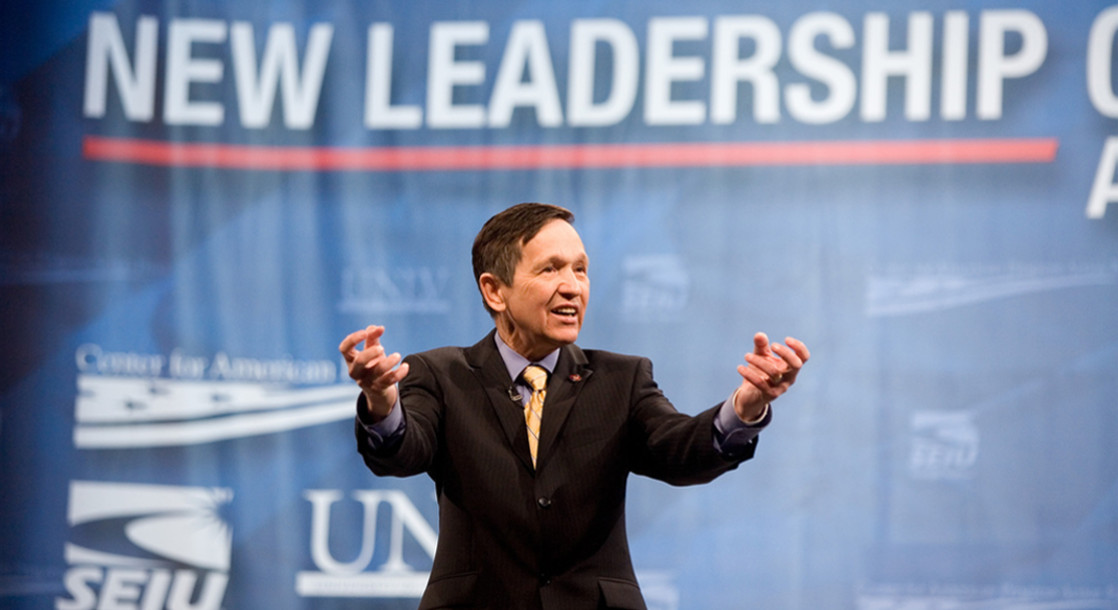Photo via Center for American Progress Action Fund
Ohio gubernatorial hopeful Dennis Kucinich is playing the pot card. Distinguishing himself from the five other Democratic candidates, Kucinich has promised that, if elected, he will expand the state’s medical marijuana program, push for industrial hemp farming, and most importantly, legalize the use and sale of recreational cannabis.
According to Cleveland.com, Kucinich, a former U.S. congressman, spoke to cannabis legalization activists at the Cleveland School of Cannabis on Wednesday, describing a legalization plan that he said would bring jobs, money, and addiction relief to the struggling Buckeye State. As state governments continue to grapple with a deadly opioid epidemic, Ohio has been particularly hard hit by addiction and overdoses, with reporters and health experts alike calling the state “ground zero” for opioid-related issues. To that point, Kucinich was adamant that increasing access to legal cannabis could help to slow or even reverse the dangerous grip of narcotics in Ohio.
"Every day that Ohioans go without access to medical cannabis, the state adds to its body count of opioid overdose deaths, many of which started with a legal prescription for painkillers," Kucinich told the crowd Wednesday.
Shortly after the cannabis-focused public appearance, Kucinich released a comprehensive nine-point plan for marijuana legalization that the candidate says he will immediately pursue if elected this coming November: “Expand Ohio’s medical marijuana law; allow home cultivation by patients & caregivers; use cannabis to reduce opioid abuse; treat not jail; restore communities most affected by the War on Drugs; deschedule & pass common sense adult-use policy; enable participation of small businesses & communities of color; use tax revenue for public health; and allow Ohio farmers to grow industrial hemp.”
In his plan, Kucinich specifically cites peer-reviewed studies about the efficacy of treating opioid addiction with medical cannabis, as well as using legalization as a tool of social justice and equality for Ohioans of color, who have for decades been unfairly prosecuted under the state’s racially biased policing tactics.
Beyond Kucinich, Ohio’s other Democratic gubernatorial nominees have largely voiced support for cannabis reform, but are still reluctant to back full legalization.
"I think we need to get this medical system established, and move into recreational in the future," state Senator Joe Schiavoni, another Ohio gubernatorial challenger, told Cleveland.com. "… I don't think the Republicans in the General Assembly are ready or willing to legalize marijuana for recreational purposes. I'm for it, and as governor, I would work with both sides to move the ball forward."
While Schiavoni was quick to hedge his bets, a quick look at last year’s gubernatorial election in New Jersey shows how pinning a ticket to cannabis legalization is not only a viable position, but a winning stance. After promising similar legalization actions on the campaign trail, Democrat Phil Murphy was able to collect media attention and public support, eventually winning the Garden State governor’s seat in November of last year.
For Murphy though, getting elected has been the easy part, with implementing his legalization plan proving significantly harder than expected. After telling voters that he would legalize adult-use cannabis within the first 100 days of his administration, Murphy has already run into significant legislative roadblocks, with only 50 days left to fulfill his promise.
Still, Kucinich is confident that his leadership skills and legalization reasoning will be well received in the Buckeye State, and he might be right. Despite a history of conservative voting, polls of Ohio voters have shown support for far-reaching cannabis reform since at least 2015, despite slow action from state legislators.
"Granted, the people here are supportive, but in the broader public, this is an idea whose time has come and in some ways, it's long overdue," Kucinich told Cleveland.com. "For those who say whatever the people say, let the people decide, this is a time for leadership. People are looking for a leader to step forward and say, let's lead with compassion. Let's lead with common sense. Let's lead with integrity. Let's lead with courage. And that's who I am."




![Snoop Dogg Plays Madden 20 with his Homies in the GGL VIII Championship [PART 2]](https://merryjane.com/wp-content/uploads/2024/04/1575590272389_ScreenShot2019-12-05at3.57.40PM.png)






